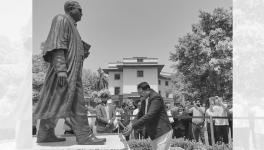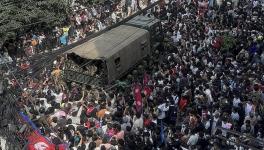Aftermath of Kashi Vishwanath Corridor: Displaced Lives, Lost Livelihoods, and Broken Families
Image Courtesy: New Indian Express
At the last lane that adjoins the Manikarnika ghat to the beginning of the Kashi Vishwanath corridor area, Shewta Devi sits in her tiny shop selling small items related to rituals and some books. “See, many tourists keep coming and going, and I have a continuous sale throughout the day,” says Devi. While handing over a small mala (a rosary) of 40 rupees, she exclaims, “The corridor is not paying me this 40 rupees! If I didn’t have this shop what would I earn?”
Devi deems herself lucky that she still has a shop to run around the famous Kashi Vishwanath Temple. Not many have had the same luck as the Kashi Vishwanath Corridor project has swept away many houses, shops and is a looming threat over traditional businesses around the Kashi Vishwanath Temple area. Costing at around 339 crore rupees in its first phase, it was inaugurated on December 13 by Prime Minister Narendra Modi. It connects the Dasashwamedha ghat to the Manikarnika ghat, providing an open, less-congested pathway for pilgrims. But the locals express dismay at how their lives have changed for the worse as this project has been rampaging for the past three years.
Shweta Devi, who revels in her luck to have fallen outside the project area, is also anxious about being too close to the project’s boundaries. “I don’t know if my shop will someday be taken away into the corridor area to make hotels as well. The policewallas (cops) who come around sometimes joke at shops like ours, saying somehow our shops have been left off, but who knows till when? They laugh at us while saying this,” Devi tells Newsclick.
The building of the corridor required vast tracts of land in the first phase itself, and more than 300 houses have been taken away from permanent residents or their tenants. For a religious Hindu, to have a house in Banaras near Kashi Vishwanath, comes attached with the sentiment of living on the land till the last day of their lives. Many of those who come to the area around the corridor for work and have been affected by the project say that before it began, lot of residents registered their protest fervently, saying ‘jaan denge makaan nahi ’ (We will give our lives but not our homes). None of it mattered to the administration and many people handed their houses over unwillingly due to the overpowering pressure exerted on them.
According to some of the affected residents, a larger agenda ‘for the development of Kashi’ was repeatedly pushed by the administration. “How long can we resist the government? They have the police, the administration. So we finally decided to give up,” says Monu Upadhyay, a worker in the corridor area who lost his house, while speaking to Newsclick.
Of course those who had their houses demolished got compensated. But compensation cannot, in any way, replace the uprooting of lives and livelihood of the people. Many people who have for long lived in this area had joint families, and their sons and brothers used to work around the same area. Ramlal’s story is an example of this; he was a resident in the corridor area but has had to move away to the outskirts of the city. He used to live in a joint family that has now disintegrated and his brothers have gone their own ways. All the brothers in Ramlal's family, including him, have been part of a bustling economy in service of the pilgrims who visit the Kashi Vishwanath Temple throughout the year. “I used to sell phool-mala (garlands) near my house. My brothers did similar things, like setting up a cart selling idli and dosa for many South Indian pilgrims. They used to buy flowers, and other puja-related items and have breakfast at our carts. All this is gone now because our house was taken away by the authorities,” Ramlal said.
Sentimental about his family disintegrating, Ramlal now frequents the corridor area, talking to some people associated with the Kashi Vishwanath Temple authority and others around the temple to give him a job. “Now that my livelihood is gone, I cannot buy another shop or do another business the same way. I am making a request to many people, so maybe sometime in the future they will employ me,” Ramlal told Newsclick.
The service economy for the pilgrims has a main attraction at the Vishwanath Gali, which has more than 100 shops selling a variety of items. It is one of the main entry gateways to the temple. A part of this commercial, iconic lane too falls into the shadow of the magnanimous Kashi Vishwanath project, and some shops have been taken away. Shop owners were readily compensated. According to the people, compensations were made as 1 lakh rupees for a small shop and 4 lakhs for a bigger shop. This is tokenistic compared to how the business of Vishwanath gali, a prime location in Banaras, is prosperous throughout the year. There is a definite flow of tourists and pilgrims. “We used to earn day and night, it was all going well but we were forced to hand over our shops to the government,” says Ganesh Kumar, an ex-shopkeeper at Vishwanath gali, “Some shopkeepers have got reassurances that they will get a shop within the corridor area once the project is completed.” Such reassurances have been on paper for only a few shopkeepers. Others have only got reassurances by word of towering admin officials. This has bred fear and anxiety among the shopkeepers pertaining to the uncertainty about their livelihood in the Kashi Vishwanath temple area.
Ganesh now does local guiding tour for tourists, along with arranging hotels and transportations for them. Simultaneously, he is also searching to rent a place to get back into selling darshan samagri to pilgrims. “The rent is very high for me to actually occupy a small shop. I am unable to get back to my work,” Ganesh said.
Overall, the shopkeepers of the Vishwanath gali stare at a bleak future as a livelihood crisis has set in at the backdrop of Narendra Modi’s mega-inauguration of the Kashi Vishwanath Corridor. The second-phase of the project is rumoured to start soon, and this has made many of the remaining shopkeepers at the Vishwanath gali anxious. They say they fear that their shops may also fall prey to the ever-expanding corridor project.
The business around the temple is distributed among many streets leading to the temple and hence, accommodating many vendors. The types of businesses here include hotels, guest houses, eateries, boat-riding facilities, etc. This diversity will be completely overhauled and centralised within the corridor premises, claims Ganesh. “It is clear that the government wants to make big five star hotels and provide all kinds of ancillary services in the corridor itself. It used to be that all kinds of people could do business around the temple and profit was distributed among many vendors and small hotel owners. Now this will be gone before long, as soon as they finish the project,” Ganesh said. The locals may never benefit from such a centralised system of business, and all profits can easily be monopolised by a few vendors.
The belief that Modi’s Banaras is preferable to the common Hindu for the betterment of the Hindu community also appears to have been shaken among many in the context of the corridor. Locals say that the heritage of the temple were the sprawling narrow streets around it, among which resided the smallest temples within people’s houses.
“It cannot be possible that when they demolished so many houses they didn’t find several Shivalingas and idols of Vinayaka. They have been deceitful and all those idols of our faith have been lost,” says Ramesh Chaudhary. According to him, the people are now increasingly skeptical of the BJP government who claims to be the protector of Hindu faith.
“If there were 350 houses demolished, at least 250 of them would have had idols,” Devi claimed.
The locals allege that the district administration's defence that no idols have been destroyed and they have been reinstated elsewhere is false. Pramod Manjhi, an outspoken leader of the Navik Union in Banaras, while talking about the corridor project, launches a vigorous critique of this government. “We thought this government was for the rights of Hindus, and for our belief in Hindutva. But these people have only fooled the Hindus. See for yourself how many idols have been thrown into the garbage,” Manjhi says.
Manjhi further claims that the only interest of this government is to do these big projects to foster profits for their own party people and nothing else. “If someone questions their motives in this project or otherwise, they silence them. So many local journalists have been silenced and many other newspaper journalists act like they are listening to our criticisms but they ignore all of it when they print,” Manjhi said.
Those who have been affected by the Kashi Vishwanath corridor project are desperate about their livelihoods and long for an almost deaf administration to listen to their problems. Others are saddened by a lost heritage, with little to no hope of relief.
The writers are freelance journalists.
Get the latest reports & analysis with people's perspective on Protests, movements & deep analytical videos, discussions of the current affairs in your Telegram app. Subscribe to NewsClick's Telegram channel & get Real-Time updates on stories, as they get published on our website.
























